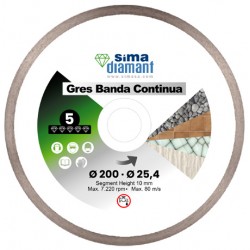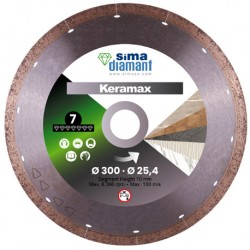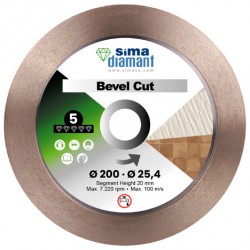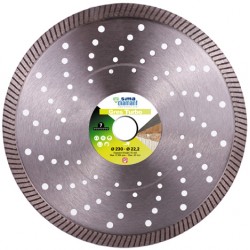

Diamond Blade for Wet Cutting Range: SIMA Diamant
Materials: Gres, Ceramics, Porcelain, Stone. Diameter: 350 mm Laser welded segment.


Diamond Blade for Wet Cutting Range: SIMA Diamant
Materials: Gres, Ceramics, Porcelain, Stone. Diameter: 350 mm Laser welded segment.


Diamond Blade for Wet Cutting Range: SIMA Diamant
Materials: Gres, Ceramics, Porcelain, Marble, Dekton. Diameter: 300 mm Laser welded segment.


Diamond Blade for Wet Cutting Range: SIMA Diamant
Materials: Gres, Ceramics. Diameter: 250 mm Laser welded segment.


Diamond Blade for Dry Cutting Range: SIMA Diamant
Materials: Granite, Gres, Ceramics, Dekton. Diameter: 230 mm Laser welded segment.
If one of your projects involves cutting tiles, your best option is choosing a diamond tile blade. They are made of steel with a synthetic diamond coating and metal powder, making it possible to cut effortlessly through very tough materials. This diamond blade tile cutter is very durable and ideal for accurate cutting. Besides, the best diamond tile blade can normally be used with other materials like porcelain or any ceramic materials, granite, stone, bricks, concrete or wall panels. Remember to read the tag and choose the right diamond blade for your saw, depending on your project’s requirements. Do not hesitate to contact us in case of any questions.
The best way to cut ceramic tiles is wet cutting. Using a diamond blade wet saw tile cutter will prevent your materials from chipping. Moreover, using a diamond blade wet tile cutter will extend the blade life, helping you to make the most of your investment, and control the dust particles. In a few words, using a diamond tile blade will make you save time and money, will make your cuts way more precise, and will avoid making a mess of your work environment as the water flow will prevent the flying particles from being all around the place.
Nevertheless, sometimes dry cutting will be preferred. For example, if you are using electrical power tools or if you are working near an electrical power source, working with a water-flow system could be dangerous; just don’t forget that dry cutting and wet cutting require different techniques. The most important one is that while dry cutting, you need to make shallow and fast passes and take pauses to prevent the blade from overheating. We also recommend applying equal pressure on both sides of the tile while cutting, but never too much pressure because the material could crack and break.